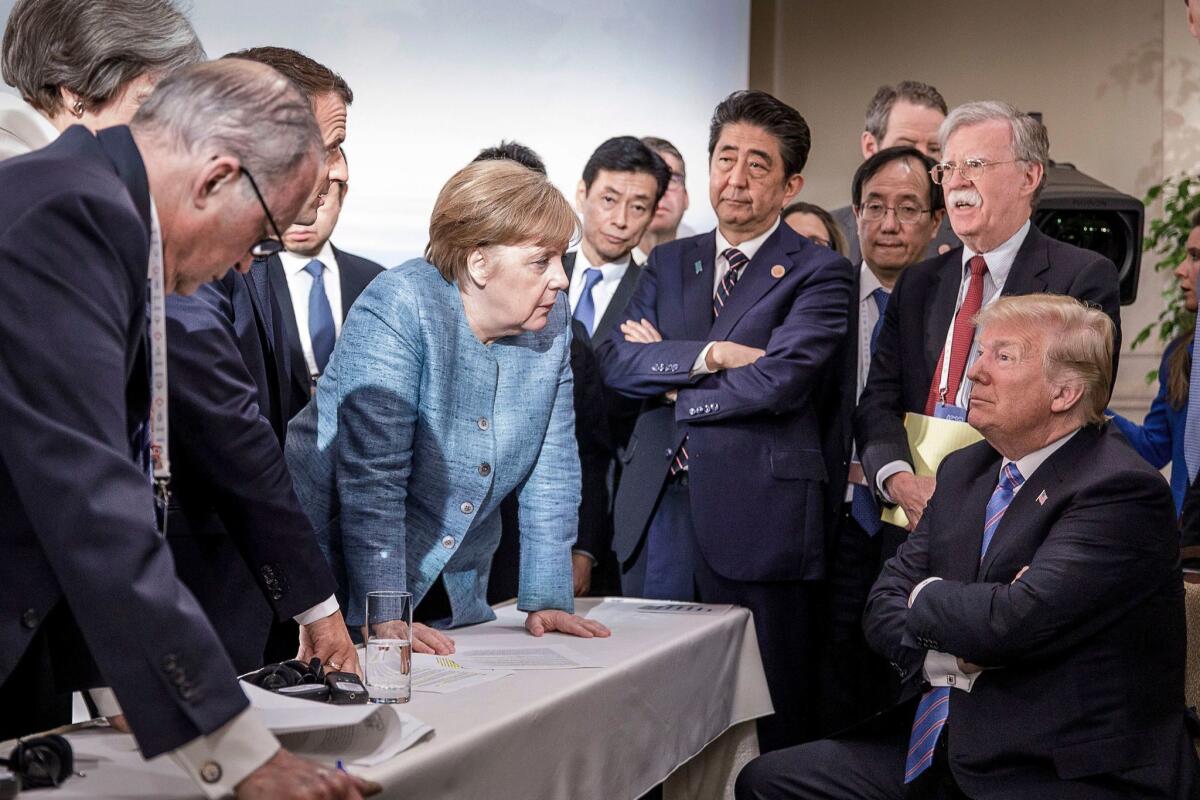Column: The global economy is slipping toward recession — and Trump is making it worse

- Share via
WASHINGTON — Warning flags are flying: The world economy is heading into a slowdown, and possibly a recession.
Germany, normally the engine of Europe, has seen its growth rate fall below zero. Britain is steeling for a potentially chaotic exit from the European Union this fall. Trade wars are buffeting China, Japan and South Korea. U.S. growth has slowed, too — partly because of the same damaging trade battles.
Before Donald Trump was president, leaders of the world’s biggest economies would react to those worrisome signals with a flurry of meetings and announcements. They’d promise to make their economic policies reinforce each other and reassure financial markets that someone was in charge. That’s what happened amid the financial crisis of 2008, and in earlier recessions and financial crises as well.
But it’s not happening this time — and Trump is one of the reasons. Case in point: this weekend’s Group of Seven summit in Biarritz, France.
The G-7 was organized in 1975 for this kind of situation: joint action to head off a recession. (In that case, the recession was already underway.) Its members include the United States, Japan, Germany, Britain, France, Italy and Canada.
A normal G-7 meeting produces a long, often boring declaration in which the leaders list everything they agreed on, beginning with efforts to bolster growth and resist trade protectionism.
This year, there probably won’t be a joint communique for the first time since 1975. “It’s pointless,” French President Emmanuel Macron, the unlucky host, shrugged last week. After all, Trump disavowed the consensus statement last year.
The main roadblock is trade — specifically, Trump’s decision to make punitive tariffs a central part of his economic strategy. He’s embroiled in a full-scale trade war with China, and he’s threatened to escalate the battle in Europe, with tariffs aimed at German automobiles and French wines.
On Friday, Trump and China fired tariffs at each other, sending stock markets plummeting. In a Twitter tirade, the president also “ordered” U.S. businesses to stop doing business with China although he has no legal authority to do so.
On Sunday, the president plans to lecture the other G-7 leaders on why they should accede to his demands. It sounds more like a campaign stunt than a serious attempt to stave off a recession.
Let’s get real: Economists say Trump’s tariff wars have made a recession more likely. They include his own appointee as chairman of the Federal Reserve, Jerome H. Powell, who said Friday that trade battles appear to be hurting U.S. manufacturing and capital spending.
“Who is our bigger enemy, Jay Powell or Chairman Xi?” a furious Trump responded on Twitter, comparing his Fed chief to Chinese President Xi Jinping. Neither presumably enjoyed being labeled an “enemy.”
But the obstacles to international action run deeper than the president’s trade policies.
Trump believes that the United States, as the world’s most powerful country, is usually better off acting alone, seeking one-on-one deals with other nations.
In his view, politics — like business — is a zero-sum game. Every encounter has a winner and loser. Other countries, including those who claim to be your allies, are generally plotting to steal you blind.
“Our allies take advantage of us far greater than our enemies,” he recently declared.
That doesn’t leave much room for cooperative efforts. And it doesn’t engender confidence among smaller countries that the United States might look after their interest as well as its own.
This isn’t only about the G-7. There are other ways major powers can work together to confront an economic crisis. Central banks and the International Monetary Fund can act, too.
But in recent history, those efforts have worked only when the United States has stepped up to lead. No other country has the wherewithal. The European Union is too disunited, China too widely mistrusted.
Trump doesn’t appear interested in assuming that leadership role — not, at least, when it means accommodating others who don’t always agree with his views.
“In the last financial crisis, both George W. Bush and Barack Obama were able to persuade the rest of the world that everybody in the lifeboat should row in the same direction,” Stewart M. Patrick, a scholar at the Council on Foreign Relations, told me. “With Trump the message might be ‘Every man for himself.’”
“You need a president who engenders confidence that he has the best interest of everyone in mind,” Patrick added. “Trump hasn’t done that.”
If a recession arrives, international cooperation could — with luck — make it shorter and milder. But what happens if the United States no longer wants to lead in that effort? Under Trump, we may find out.
More to Read
Get the L.A. Times Politics newsletter
Deeply reported insights into legislation, politics and policy from Sacramento, Washington and beyond. In your inbox twice per week.
You may occasionally receive promotional content from the Los Angeles Times.











